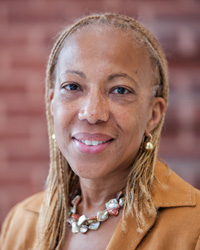On a Mentoring Mission
Lorraine Fleming was never bothered by the fact that she didn’t have a strong mentor early in life. College bound and full of potential, she worked hard in school and took the opportunities that were presented to her. Throughout her academic career, she had invaluable mentors who guided her. Today, she is the Interim Dean of the College of Engineering, Architecture & Computer Sciences at Howard University and is determined to pay that forward as an advocate for mentoring.
Over the last 10 years, Fleming has started a number of acclaimed mentoring programs in STEM education. In fact, last March, she received the Presidential Award for Excellence in Science, Mathematics and Engineering Mentoring (PAESMEM), America’s highest mentoring award. As part of the honor, she and 13 other recipients were invited to the White House to meet President Obama in the Oval Office.
“For him to take the time to come and talk to us and to take each one of us into the Oval Office to shake our hands, it showed how serious he was about our work,” she says with a mix of pride and excitement.
Global STEM Education
Fleming was nominated for developing programs at Howard University that encourage students to consider futures in research and give them opportunities to do research projects abroad. One of her programs, the Global Education and Awareness Research Undergraduate Program (GEAR-UP), sends students around the world to tackle social issues through focused research projects.
“I want the students to actually see what it is like to do engineering in an environment other than the U.S.,” she explains. “I know they can do the technology part, I’ve trained them for that, but I want them prepared to handle the culture shock that might arise.”
GEAR-UP sends groups of students to eight different countries every year and selecting the destinations based on their uniqueness and the social justice issues that could benefit from the students’ efforts.
“We’re not in Paris or Rome. We’re in Thailand, Indonesia, and Romania,” she says proudly. “We intentionally go to developing countries and emerging markets to expose the students to other cultures and the incredible resourcefulness of places that present challenges that we would never face in the U.S.”
In Nairobi, Fleming’s students worked with researchers who only had access to Internet for three hours a day. The local university students showed her students how they were using flash drives to store data and stretch their web-dependent research beyond the three-hour limit.
“Our students have worked on waste water treatment in Kenya, traffic problems in Ethiopia, and in Tanzania they lived and worked in a Muslim culture for the first time in their lives,” she says. “By taking their research to the international environment and immersing them in these unique situations, we’re preparing them to be globally minded professionals,” she explains.
Creating Pathways for Success
Fleming’s other program, the Howard University Science, Engineering, and Mathematics Program (HUSEM), was developed to offer undergraduate students research opportunities that they might not receive at an internship. It gives students a chance to take a legitimate look at pursuing graduate study.
“We introduce them to research and tell them that they are PhD-bound to expose them to another path that they may not have considered,” she says, speaking from experience.
The Power of a Mentor
The first in her family to leave the Caribbean island of St. Thomas, Fleming had all the raw talent to succeed in a technical field; she just lacked guidance.
Without a mentor to guide her, she only applied to one school, and became a math major because it was her best subject. Not a bad decision, but in hindsight she realizes she made most of her choices based on instinct more than a broader consideration of where her education was going to take her.
“I was only a math major for one semester. I remember being in my first calculus class, looking around the room, and realizing I was the only student that wasn’t an engineering major,” she recalls with a smile. “I thought, ‘what am I missing here?’”
Still running on instinct, she went to change her major to engineering. When they asked her what kind of engineering she wanted to major in she said, “Civil sounds good.” Fleming later graduated with honors from Howard University.
“That was how I made decisions back then, and that is how all students make decisions without the guidance of a mentor,” she adds.
It wasn’t a coincidence that Fleming wound up back at Howard after completing her doctorate at UC Berkeley. “When I graduated from Howard it was always my intention to get the credentials I needed to come back and teach students that had similar life experiences to my own,” she remembers. “I never had any guidance in getting to engineering, so I wanted to offer that opportunity to students with backgrounds like mine.”
Through Fleming’s programs, students aren’t just getting the guidance to chase careers they would have never considered. They are doing research all over the world and becoming fully immersed and attuned to a global economy that they will soon be more qualified than most to work in. Fleming had help along the way, but the mentors that she found were largely by coincidence. Thanks to her efforts, the students at Howard won’t have to leave their futures to chance.
